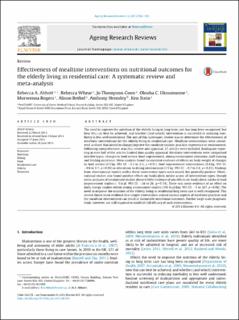| dc.contributor.author | Abbott, Rebecca A. | |
| dc.contributor.author | Whear, Rebecca | |
| dc.contributor.author | Thompson-Coon, Jo | |
| dc.contributor.author | Ukoumunne, Obioha C. | |
| dc.contributor.author | Rogers, Morwenna | |
| dc.contributor.author | Bethel, Alison | |
| dc.contributor.author | Hemsley, Anthony | |
| dc.contributor.author | Stein, Ken | |
| dc.date.accessioned | 2020-06-03T12:57:20Z | |
| dc.date.available | 2020-06-03T12:57:20Z | |
| dc.date.issued | 2013 | |
| dc.identifier.citation | Abbott, R. A., Whear, R., Thompson-Coon, J., Ukoumunne, O. C., Rogers, M., Bethel, A., . . . Stein, K. (2013). Effectiveness of mealtime interventions on nutritional outcomes for the elderly living in residential care: a systematic review and metaanalysis. Ageing research reviews, 12(4), 967-981. | en_US |
| dc.identifier.uri | https://hdl.handle.net/11250/2656404 | |
| dc.description.abstract | The need to improve the nutrition of the elderly living in long term care has long been recognised, but how this can best be achieved, and whether (and which) intervention is successful in reducing morbidity is less well understood. The aim of this systematic review was to determine the effectiveness of mealtime interventions for the elderly living in residential care. Mealtime interventions were considered as those that aimed to change/improve the mealtime routine, practice, experience or environment. Following comprehensive searches, review and appraisal, 37 articles were included. Inadequate reporting in over half of the articles limited data quality appraisal. Mealtime interventions were categorised into five types: changes to food service, food improvement, dining environment alteration, staff training and feeding assistance. Meta-analysis found inconsistent evidence of effects on body weight of changes to food service (0.5 kg; 95% CI: −1.1 to 2.2; p = 0.51), food improvement interventions (0.4 kg; 95% CI: −0.8 to 1.7; p = 0.50) or alterations to dining environment (1.5 kg; 95% CI: −0.7 to 2.8; p = 0.23). Findings from observational studies within these intervention types were mixed, but generally positive. Observational studies also found positive effects on food/caloric intake across all intervention types, though meta-analyses of randomised studies showed little evidence of any effects on food/caloric intake in food improvement studies (−5 kcal; 95% CI: −36 to 26; p = 0.74). There was some evidence of an effect on daily energy intakes within dining environment studies (181 kcal/day, 95% CI: −5 to 367, p = 0.06). The need to improve the nutrition of the elderly living in residential long term care is well recognised. This review found some evidence that simple intervention around various aspects of mealtime practices and the mealtime environment can result in favourable nutritional outcomes. Further large scale pragmatic trials, however, are still required to establish full efficacy of such interventions. | en_US |
| dc.publisher | Ageing Research Reviews | en_US |
| dc.subject | nutrition | en_US |
| dc.subject | dining | en_US |
| dc.subject | food | en_US |
| dc.subject | residential care | en_US |
| dc.subject | elderly | en_US |
| dc.subject | dementia | en_US |
| dc.subject | mat | en_US |
| dc.subject | måltider | en_US |
| dc.title | Effectiveness of mealtime interventions on nutritional outcomes for the elderly living in residential care: A systematic review and meta-analysis | en_US |
| dc.type | Journal article | en_US |
| dc.source.pagenumber | 967-981 | en_US |
| dc.source.volume | 12 | en_US |
| dc.source.journal | Ageing Research Reviews | en_US |
| dc.source.issue | 4 | en_US |
| dc.identifier.doi | https://doi.org/10.1016/j.arr.2013.06.002 | |
| dc.description.localcode | måsjekkes | |
